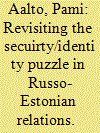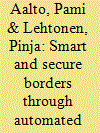|
|
|
Sort Order |
|
|
|
Items / Page
|
|
|
|
|
|
|
| Srl | Item |
| 1 |
ID:
081966


|
|
|
|
|
| Publication |
Hampshire, Ashgate Publishing Limited, 2008.
|
| Description |
xvi, 220p.
|
| Series |
International political economy of new regionalism series
|
| Standard Number |
9780754648086
|
|
|
|
|
|
|
|
|
|
|
|
Copies: C:1/I:0,R:0,Q:0
Circulation
| Accession# | Call# | Current Location | Status | Policy | Location |
| 053598 | 333.79094/AAL 053598 | Main | On Shelf | General | |
|
|
|
|
| 2 |
ID:
143802


|
|
|
|
|
| Summary/Abstract |
This essay examines the modernisation of the Russian energy sector as revealed in the case of Arctic offshore oil. The Russian actors involved have various interests but their simultaneous realisation is impeded by the structural constraints within the policy environment of Arctic offshore oil projects. Russia’s foreign policy choices vis-à-vis Ukraine, leading to sanctions targeting Arctic oil projects, and global oil market developments amplify the constraints on the resource geographical, financial, institutional and ecological dimensions of the policy environment or structure. This delays Arctic offshore oil projects, and hampers the oil industry’s modernisation and its capacity to generate income for Russia’s overall modernisation.
|
|
|
|
|
|
|
|
|
|
|
|
|
|
|
|
| 3 |
ID:
056148


|
|
|
| 4 |
ID:
079902


|
|
|
|
|
| Publication |
2007.
|
| Summary/Abstract |
This article enters the recent debate on the decline in the features of international society within the current system by looking at the case of Russia; a case that has, to date, received little attention. Russia is considered one of the great powers. It is also characterised by a long-standing quest for membership in international society. In addition, Russia merits closer attention as a result of its strategic partnership with the EU. The EU offers Russia access to regional-level international societies with a thicker set of institutions than are available in its relations with the United States and Asia. The fact that Russia identifies itself with Europe has driven it to experiment with some of the solidarist institutions typifying EU-centred societies, most notably the market. As a result there are tangible prospects for maintaining and even expanding the features of international society at the level of greater Europe regardless of the systemic constraints
|
|
|
|
|
|
|
|
|
|
|
|
|
|
|
|
| 5 |
ID:
153341


|
|
|
|
|
| Summary/Abstract |
The European Commission launched the “Smart Borders” policy process in 2011 to enhance border security in the European Union (EU) using technologisation and harmonisation. This includes the use of automated border control (ABC) systems. The Member States crucially shape the process, weighing security technologies and costs, privacy and rights, and further institutional choices. We examine the views of political stakeholders in four Member States by conducting a systematic empirical and comparative study unprecedented in the existing, political-theory-inspired research. In our Q methodological experiments, political stakeholders in Finland, Romania, Spain and the UK rank-ordered a sample of statements on Smart Borders, ABC and harmonisation. The factor analysis of the results yielded three main views: the first criticising ABC as a security technology, the second welcoming the security gains of automation and the third opposing harmonised border control. While impeding harmonisation, the results offer a consensus facilitating common policy.
|
|
|
|
|
|
|
|
|
|
|
|
|
|
|
|
| 6 |
ID:
145428


|
|
|
|
|
| Summary/Abstract |
In this article, we examine Russia’s geo-economy under the economic sanctions imposed by the EU, the USA and many other states since spring 2014, including restrictions on economic cooperation in areas such as trade, certain types of energy technology, access to credit, trade in arms, travel bans and asset freezing. We first examine Russia’s economic and geopolitical interests and the cognitive frames Russian policymakers use to weigh these diverse interests against each other. Second, we examine how Russian policymakers can further these interests given the effect of the sanctions on Russia’s geo-economy. We analyse constraints and opportunities along the resource geographic, financial and institutional dimensions of geo-economy. Regarding resources, the sanctions seriously hamper new greenfield projects in Russia’s emerging energy provinces. They impede the industry’s middle- to long-term prospects while some Russians perceive new opportunities for its domestically induced modernisation. Along the financial dimension, low oil prices since mid-2014 shape existing fossil fuels trade more than the sanctions, which have no impact on Russia’s arms exports. The combined effect of low oil prices and sanctions on Russia’s state budget, the financial sector and the rouble is severe. On the institutional dimension, Russia’s international standing suffers, but its domestic institutions are relatively resilient. Overall, we see Russia as part of an international structure where it can constitute itself as an autonomous geo-economic actor under favourable conditions including high oil prices and no sanctions.
|
|
|
|
|
|
|
|
|
|
|
|
|
|
|
|
|
|
|
|
|